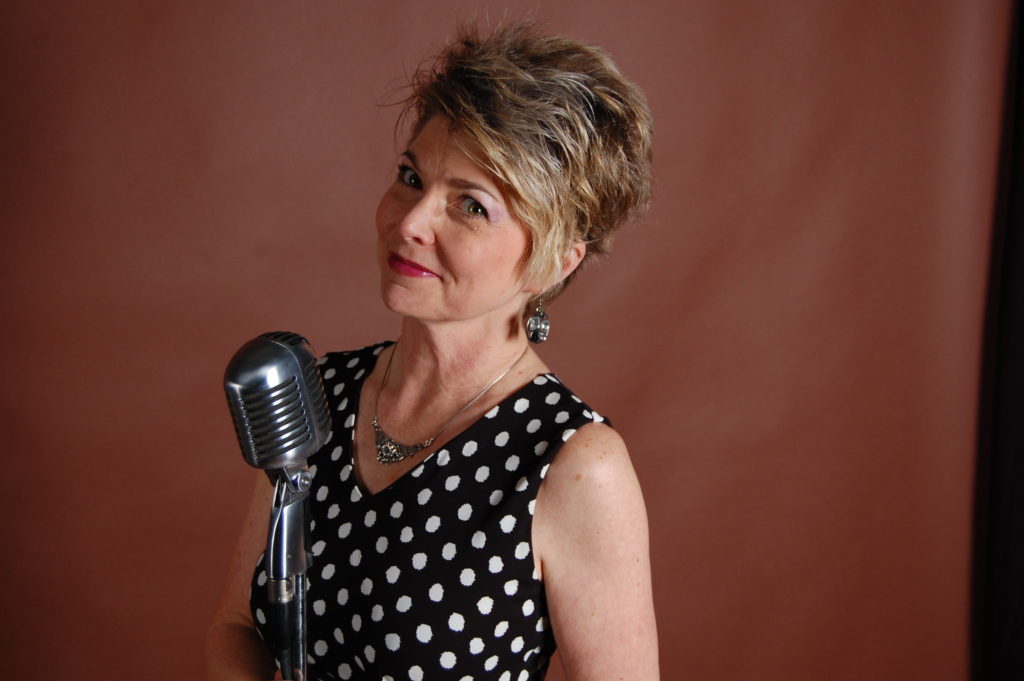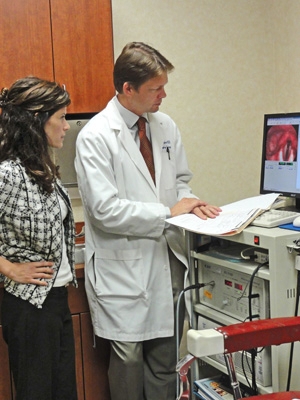
March 22, 2021
Ann Hunt is a vocalist for The House Jumpers and vocalist and bass player for With a Twist, and co-owner of House Rent Records.
In December of 2005 I woke up with a sore throat and earache. Nothing unusual for me. As a teacher, it was rare for me to get through the winter without at least one upper respiratory event. That had been my pattern since I was little and what I woke up with wasn’t that bad on my scale of pain and discomfort. However, three weeks later, I was still hoarse and unable to speak clearly. Something was different this time.
At the ear, nose, and throat doctor’s (ENT) office, the laryngoscope of my throat indicated I had a paralyzed left vocal fold (cord). It was rigid and would not meet the other fold at the midpoint for my voice to sound full and connected. Because I had not had a physical injury due to a car accident or a fall, the assumption was the nerve to that fold had been damaged by a virus. The doctor predicted that I had about a 50/50 chance of the nerve healing and my voice returning to normal function. The ENT told me IF the nerve was going to heal it could take up to a year. If the nerve did not heal and my voice return to normal function in a year, it probably never would. In the meantime, there was really nothing I could do.
I had been singing all my life. Choirs, musicals, bands, and just for my own enjoyment when I needed a pick me up. I had taught music my entire professional life and had conducted various community and church choirs. Because of my voice problem, it had become nearly impossible for me to teach and I could not sing a note. I didn’t recognize what little voice I heard when I tried to talk, and I felt as if I had lost an essential part of my identity.
My first point of telling this story is…always get a second opinion, maybe even a third. I left that first ENT office shaken, scared, and lost. Fortunately, my husband Marvin had worked at the University of Kansas for the Speech-Language-Hearing Department. He knew a lot about testing and how to identify vocal/hearing dysfunctions. Marvin is also a musician, so he quickly set up an amplification system at my school to amplify what little voice I had left. That was a tremendous help. He also began to research where we could go for additional testing and advice. We eventually went to the Department of Hearing and Speech Sciences at Vanderbilt University. I was given much the same prognosis, but also some helpful suggestions regarding various voice strengthening exercises by a Dr. Stemple. At the end of the visit, the doctor asked me why I wasn’t going to the voice center in my hometown of Lawrence, Kansas because it had an excellent reputation. Why indeed???

Kansas Voice Center
The minute I met Dr. Reussner, an otolaryngologist, and Jennifer Cannady, a speech therapist, at the Kansas Voice Center I knew I had the support I needed. Both have a lot of experience working with many different types of folks, including singers, teachers, clergy, salespeople, and others who were in professions that are vocally demanding. Ms. Cannady is also a singer with a lot of performance experience and Dr. Reussner is a music lover. Wow-these folks understood me! Although the prognosis was not different, their approach to how they could help me was as a team. Jennifer immediately started working with my vocal production to strengthen what function I had left. Dr. Reussner explained what we would do along the way to see if I was gaining back my nerve function, and my options. I knew it was possible that I would not sing again, but I could regain a more normal speaking function and that was essential. One option would have been to surgically place a silastic shim in the affected vocal fold so it could make contact with the other fold. I would have been able to speak more normally but lost most of my singing ability.
Nearly a year later, I noticed one day at school that my voice was sounding a bit more normal. I didn’t want to get too excited at first. About a week later a colleague asked me if my voice was coming back. That is when I started to get more hopeful. Dr. Reussner soon confirmed that the nerve was working again, and I was gaining more function. In time, my vocal function returned to where I can speak normally and sing well. In fact, when I started to get better, Dr. Reussner asked: Are you singing? When I said not yet, he indicated that would be one of the best things to do to help regain my vocal strength and abilities. Yea!
As a result of my vocal dysfunction experience, I have learned a lot about vocal problems as we age. Vocal fold paralysis is not that uncommon. It can be the result of a virus, an injury, a stroke, a disease such as Parkinson’s, a growth, or having a breathing tube inserted through your vocal folds during surgery. In my opinion, it doesn’t help that the media often depicts older people as having breathy, raspy voices. It gives the impression that an aging voice is just part of what happens…no way! I believe if you sound old, you begin to think of yourself as old. Marvin and I marveled at how well a nearly 100-year-old women spoke with energy and clarity during a TV interview. In fact, at one point she was continuously singing to herself! When asked about that, she said she sang all the time…no wonder you couldn’t tell her age by her speaking voice.
What can you do to preserve and strengthen your voice? Lots!
- If you have had prolonged hoarseness get to an otolaryngologist who will scope your throat. Problems with vocal function cannot be diagnosed just by looking down your throat. Although not the most pleasant experience, it really isn’t that bad. In fact, it can be interesting.
- Research what types of therapies the otolaryngologist offers for the various vocal dysfunctions that tend to occur as we age. One example is spasmodic dysphonia. For this dysfunction, Dr. Reussner may use Botox injections to reduce or eliminate spasms. Often, patients also receive speech therapy with Ms. Cannady in conjunction with the injections which lengthens time between injections and improves vocal quality. Be sure your medical folks work with older clients as part of their regular clientele.
- Discuss with your medical team what medications you are taking. Dr. Reussner provides a lot of information about the effects of various over-the-counter meds on the voice. It may be your hoarseness is related to that, or allergies. Find out and follow any recommendations you receive.
- Do vocal exercises that help strengthen your voice. I have mentioned exercises by Dr. Stemple. His exercises emphasize using efficient breath and resonance. You do not need to be a “singer” to understand how to do the exercises. Over time you will notice a difference if you keep at it regularly. You may also be advised to do vocal therapy with a speech therapist. Do it! Ms. Cannady really helped me to better understand my overall vocal function and I know I am still singing today because of her expertise and advice.
- If singing isn’t your thing (although, come on, you know you do in the shower!) use your speaking voice by reading aloud. I advise this in conjunction with working with a speech therapist. I knew a woman who was reading aloud to patients at a care facility and was losing her voice due to vocal strain. After some therapy and learning appropriate exercises, she learned to read aloud with better vocal production. Thus, she was able to return to reading to the residents which brought them, and her, much joy.
The most important thing to do is get going! Initially I didn’t want to go to the doctor because I was in denial. I KNEW something was wrong, but I didn’t want to face or acknowledge it. But, once I did and found the right doctor and speech therapist, I began to heal, vocally and emotionally. I realize I am lucky to have regained my voice. However, if I had not, I also know I would have been able to speak more normally due to the therapy and support I received from my medical folks and most of all my husband.
Remember, how you hear your voice is directly linked to your self-identity. Keeping it healthy, vibrant, and energetic is a goal anyone can achieve. How we hear, and see ourselves, is also how others view us. So, let’s keep our voices strong and clear as we continue to define our place in society in the years to come. We have a lot to say!

Resources:
Kansas Voice Center: click on HOME below
Home
An Introduction of Vocal Function Exercises by Joseph Stemple, PhD
